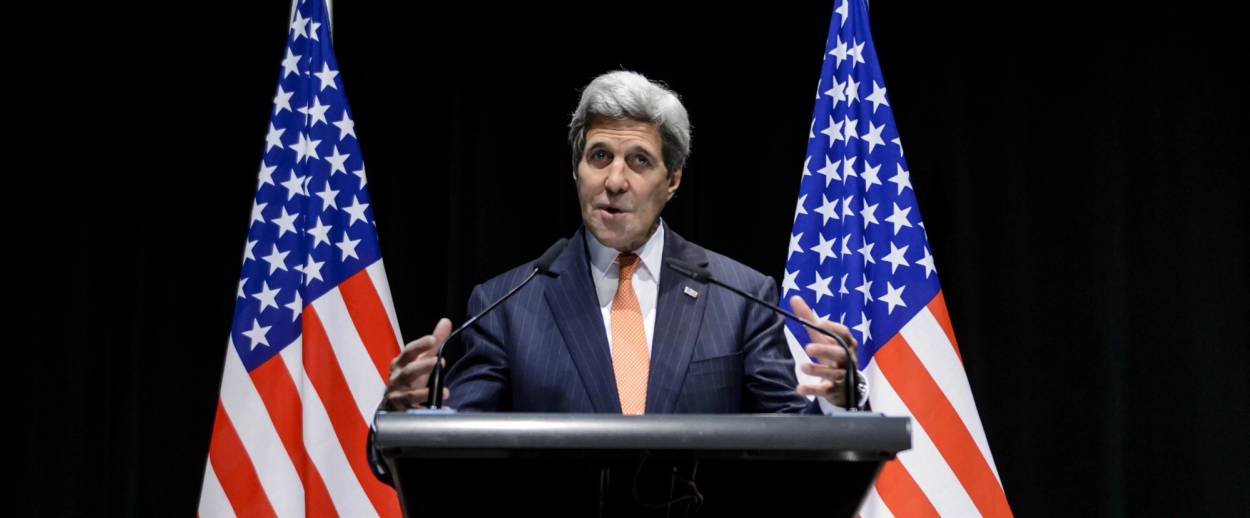Is the Obama Administration Ceding Too Much in the Iran Nuclear Talks?
As the deadline nears, opponents desire the Islamic Republic to come clean on PMDs




The Iranian nuclear arms deal moves towards its final stage this week as delegates from the various parties involved gather in Vienna to try and reach a definitive agreement before the June 30 deadline. The major concern now for many is the Obama Administration’s apparent willingness to allow Iran to keep any of its past research into nuclear weaponry under wraps. The issue is: what was once a crucial demand of Iran—that the Islamic Republic reveal the possible military dimensions (PMDs) of the history of their nuclear weapons program—has transformed into a “potential deal breaker” for the Iranians, Politico reported yesterday.
The news came to light on June 11 when U.S. officials told the AP that questions regarding the PMDs would not be answered before the deal’s final deadline. The decision allegedly followed an assessment of the situation by the “U.N. nuclear agency’s top official.”
Last week, Secretary of State John Kerry told reporters, “We’re not fixated on Iran specifically accounting for what they did at one point in time or another… We have absolute knowledge with respect to the certain military activities they were engaged in.” Kerry’s statement suggests that the U.S has secured enough intelligence about Iran’s past nuclear weapon program for a direct confession to be unnecessary.
But “Kerry’s words riled Republicans in Congress and pro-Israel leaders,” Politico reported, “who slammed them as a dangerous concession to Iran.”
For Israeli minister Yuval Steinitz, the concession completely rocks the foundations of the chance at an honest and secure deal. “If the world allows you to lie about the past, this guarantees you will lie about the future,” he commented.
The concession is also seen to have a more tangible and potentially pernicious effect. For one, Iran’s ability to hide the progress they have made in developing nuclear technology means that they retain the dangerous element of surprise. In an article for The Washington Institute, Olli Heinonen, a former deputy of the International Atomic Energy Agency (IAEA), wrote that the Obama Administration claims one of its major achievements with the current agreement is the increase of Iran’s “breakout time”—the length of time it would take for the Islamic Republic to manufacture “enough weapons-grade uranium to create one nuclear weapon”—from a few months to at least a year.
However, Heinonen states that if Iran succeeds in being able to conceal its progress it has made in weaponizing nuclear power, it would naturally take longer for a violation in the agreement to be detected in the event of a breach of its terms. Heinonen writes: “If Tehran does not try to conceal what it is doing, the IAEA would detect a violation fairly quickly—in the worst case perhaps two weeks.” But if Iran remains opaque about its activity, a violation would be much harder to detect. This means that an Iranian nuclear weapon has the potential to be very close to completion by the time IAEA intelligence exposes the hypothetical violation.
The Administration also argues that the Iran’s unwillingness to come clean isn’t an attempt at deception; rather it’s due to a fatwa issued by the Ayatollah Ali Khamenei back in 2003. According to Politico, the fatwa decreed that the manufacture of nuclear weaponry was un-Islamic and thus the public disclosure of Iran’s nuclear program would bring “humiliation” upon the Ayatollah and his regime.
Although this may be true, it has been argued that the consequence of saving the Ayatollah from humiliation, is that Iran will be able to maintain its stance that it never has done anything wrong. Despite evidence to the contrary, Iran has always denied that it has ever had a nuclear program. Writing for The Times of Israel, Emily Landau, Head of the Arms Control program at the Institute for National Security Studies, comments that Iran’s continued ability to construct a blameless narrative in regards to the existence of its nuclear program has “created enormous difficulties for negotiators over the years.”
Omri Ceren, part of The Israel Project, an organization that provides information about the Middle-East to American policy makers and journalists, concurs. He told me that the Administration’s desire for a simple and superficial “let the past be forgotten” resolution to the arms deal is completely out of touch with the practical reality of the situation. Ceren explained that the Administration remains blind to the “propaganda value” that the Iranians seek to gain from such a deal, as well as its “kneecapping” of Israeli ambassadors and U.N officials who are trying to enforce the Non-Proliferation Agreement in Iran. Landau effectively describes the nature of this “kneecapping” when she writes that the deal gives Iran the ability to “accuse the West of building a false case against Iran, as it did regarding Iraq’s WMD capabilities.”
Jas Chana is a former intern at Tablet.